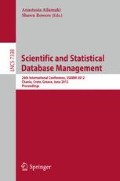Abstract
In scientific databases, the amount and the complexity of data calls for data summarization techniques. Such summaries are used to assist fast approximate query answering or query optimization. Histograms are a prominent class of model-free data summaries and are widely used in database systems.
So-called self-tuning histograms look at query-execution results to refine themselves. An assumption with such histograms is that they can learn the dataset from scratch. We show that this is not the case and highlight a major challenge that stems from this. Traditional self-tuning is overly sensitive to the order of queries, and reaches only local optima with high estimation errors. We show that a self-tuning method can be improved significantly if it starts with a carefully chosen initial configuration. We propose initialization by subspace clusters in projections of the data. This improves both accuracy and robustness of self-tuning histograms.
Access this chapter
Tax calculation will be finalised at checkout
Purchases are for personal use only
Preview
Unable to display preview. Download preview PDF.
References
Baltrunas, L., Mazeika, A., Böhlen, M.H.: Multi-dimensional histograms with tight bounds for the error. In: IDEAS, pp. 105–112 (2006)
Beyer, K., Goldstein, J., Ramakrishnan, R., Shaft, U.: When Is ”Nearest Neighbor” Meaningful? In: Beeri, C., Bruneman, P. (eds.) ICDT 1999. LNCS, vol. 1540, pp. 217–235. Springer, Heidelberg (1998)
Bruno, N., Chaudhuri, S., Gravano, L.: Stholes: a multidimensional workload-aware histogram. SIGMOD Rec. 30, 211–222 (2001)
Deshpande, A., Garofalakis, M., Rastogi, R.: Independence is good: dependency-based histogram synopses for high-dimensional data. SIGMOD Rec. 30, 199–210 (2001)
Gunopulos, D., Kollios, G., Tsotras, V.J., Domeniconi, C.: Approximating multi-dimensional aggregate range queries over real attributes. SIGMOD Rec. 29, 463–474 (2000)
Guttman, A.: R-trees: A dynamic index structure for spatial searching. In: Yormark, B. (ed.) SIGMOD 1984, Proceedings of Annual Meeting, Boston, Massachusetts, June 18-21, pp. 47–57. ACM Press (1984)
Khachatryan, A., Müller, E., Böhm, K., Kopper, J.: Efficient Selectivity Estimation by Histogram Construction Based on Subspace Clustering. In: Bayard Cushing, J., French, J., Bowers, S. (eds.) SSDBM 2011. LNCS, vol. 6809, pp. 351–368. Springer, Heidelberg (2011)
Luo, J., Zhou, X., Zhang, Y., Shen, H.T., Li, J.: Selectivity estimation by batch-query based histogram and parametric method. In: ADC 2007, pp. 93–102. Australian Computer Society, Inc., Darlinghurst (2007)
Müller, E., Günnemann, S., Assent, I., Seidl, T.: Evaluating clustering in subspace projections of high dimensional data. PVLDB 2(1), 1270–1281 (2009)
Muthukrishnan, S., Poosala, V., Suel, T.: On Rectangular Partitionings in Two Dimensions: Algorithms, Complexity, and Applications. In: Beeri, C., Bruneman, P. (eds.) ICDT 1999. LNCS, vol. 1540, pp. 236–256. Springer, Heidelberg (1998)
Poosala, V., Ioannidis, Y.E.: Selectivity estimation without the attribute value independence assumption. In: VLDB 1997, pp. 486–495. Morgan Kaufmann Publishers Inc., San Francisco (1997)
Roh, Y.J., Kim, J.H., Chung, Y.D., Son, J.H., Kim, M.H.: Hierarchically organized skew-tolerant histograms for geographic data objects. In: SIGMOD 2010, pp. 627–638. ACM, New York (2010)
SDSS Collaboration. Sloan Digital Sky Survey (August 27, 2011)
Sellis, T.K., Roussopoulos, N., Faloutsos, C.: The r+-tree: A dynamic index for multi-dimensional objects. In: VLDB, pp. 507–518 (1987)
Srivastava, U., Haas, P.J., Markl, V., Kutsch, M., Tran, T.M.: Isomer: Consistent histogram construction using query feedback. In: ICDE 2006, p. 39. IEEE Computer Society, Washington, DC (2006)
Wang, H., Sevcik, K.C.: A multi-dimensional histogram for selectivity estimation and fast approximate query answering. In: CASCON 2003, pp. 328–342. IBM Press (2003)
Wang, H., Sevcik, K.C.: Histograms based on the minimum description length principle. The VLDB Journal 17 (May 2008)
Yiu, M.L., Mamoulis, N.: Frequent-pattern based iterative projected clustering. In: ICDM 2003, pp. 689–692 (2003)
Author information
Authors and Affiliations
Editor information
Editors and Affiliations
Rights and permissions
Copyright information
© 2012 Springer-Verlag Berlin Heidelberg
About this paper
Cite this paper
Khachatryan, A., Müller, E., Stier, C., Böhm, K. (2012). Sensitivity of Self-tuning Histograms: Query Order Affecting Accuracy and Robustness. In: Ailamaki, A., Bowers, S. (eds) Scientific and Statistical Database Management. SSDBM 2012. Lecture Notes in Computer Science, vol 7338. Springer, Berlin, Heidelberg. https://doi.org/10.1007/978-3-642-31235-9_22
Download citation
DOI: https://doi.org/10.1007/978-3-642-31235-9_22
Publisher Name: Springer, Berlin, Heidelberg
Print ISBN: 978-3-642-31234-2
Online ISBN: 978-3-642-31235-9
eBook Packages: Computer ScienceComputer Science (R0)

